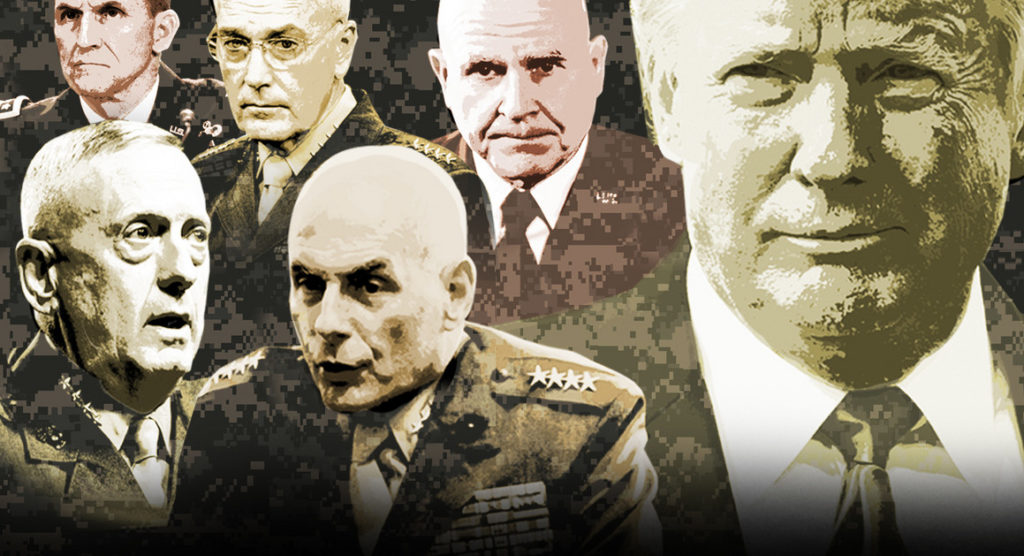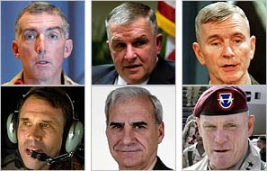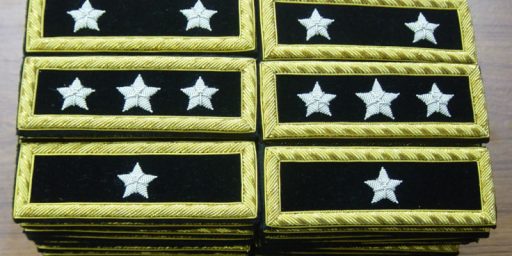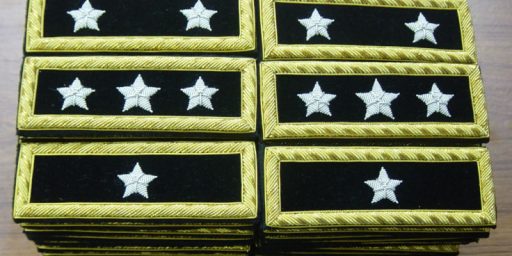Trump’s Generals
My contribution to a continuing debate.

Last August, I published an essay in Defense One titled, “Who Decides Who Is a ‘Domestic Enemy’?” It was a response to a call from two distinguished retired Army officers for the Chairman of the Joint Chiefs to remove President Trump from office by force in the event he refused to leave the White House after losing an election. The next day, I received an inquiry from Mike Guillot, the outgoing editor of Strategic Studies Quarterly, as to whether I would be interested in contributing to a special issue on civil-military relations edited by Jim Golby. While that sounded like a lot of work, the opportunity to work with Golby, a rising superstar in the field, was too good to pass up, so I accepted.
I was right. It was a lot of work! It took weeks just to figure out exactly what I wanted to write about and several more weeks to cobble together a draft. My research question was whether President Trump’s filling his cabinet with so many retired generals did further damage to civil-military relations, as so many scholars in the field (myself included) predicted it would. After doing the work, I concluded that, while there were indeed a remarkable number of crises on the civil-military relations front, they were a function of Trump, not the generals.
The first draft was rough and I got a lot of helpful pushback from Guillot and, especially, Golby that forced me to bolster my arguments. And because of the long window between my submissions and going to press, there were multiple new developments—most notably the January 6 attack on the Capitol and President Biden’s nomination of Lloyd Austin as Secretary of Defense—that I needed to incorporate into the revisions.
The issue went live last night and my contribution, “Trump’s Generals: A Natural Experiment in Civil-Military Relations,” is available in PDF format at the link. The abstract:
President Donald Trump’s filling of numerous top policy positions with active and retired officers he called “my generals” generated fears of militarization of foreign policy, loss of civilian control of the military, and politicization of the military—yet also hope that they might restrain his worst impulses. Because the generals were all gone by the halfway mark of his administration, we have a natural experiment that allows us to compare a Trump presidency with and without retired generals serving as “adults in the room.” None of the dire predictions turned out to be quite true. While Trump repeatedly flirted with civil-military crises, they were not significantly amplified or deterred by the presence of retired generals in key roles. Further, the pattern continued in the second half of the administration when “true” civilians filled these billets. Whether longer-term damage was done, however, remains unresolved.
Unbeknown to me until Golby previewed the issue on Twitter a couple of weeks back, the other contributors to the issue are rock stars in the field. Former Chairman of the Joint Chiefs Martin E. Dempsey leads off the issue and he’s followed by a murderer’s row of civil-military relations scholars: Peter Feaver and Dick Kohn, Kori Schake, Pauline Shanks Kaurin, Risa Brooks, and Mac Owens. And then me. I can now appreciate how Christian Laettner felt when he was on the 1992 Olympic Dream Team.





Congratulations! I look forward to reading the piece.
I’ve often wondered how Trump’s generals reacted to his claim that he knew more about ISIS than they did.
Congrats, James. Nice to get yourself in good company.
You’re a star!
Congrats James, on finding yourself among such sterling individuals.
Congratulations 🙂
Congratulations, James.
Congrats!
A separate series could discuss how obvious wackaloons manage to climb to influential positions in the military and ensconce themselves in the body politic. Perhaps that’s asking too much of any human organization.
Boom. Congratulations, James. Look forward to reading it.
Just finished reading it. It was a good survey of the issue. Outside of the immediate past, it is clear that CMR are impacted by a couple of longer term trends:
1) the need for actual expertise in running the $trillion defense establishment (I also include the VA, the National Nuclear Security Agency, and all the intelligence agencies). This need naturally attracts defense specialists who are often retired military (of all ranks).
2) The natural attraction the defense establishment has for retired military. Back in the 80s, retired officers had to have their retirement pay offset by their civil servant pay which disincentivized the seeking of DoD civilian positions. That was done away with. Now it is too common for retirees to show up the next day in a civilian DoD job. Result is a narrowing of viewpoints. Similar incentives exist because of veterans’ preferences for civil service jobs.
3) The ever tightening web of the military-industrial complex (which Eisenhower warned about and which became true). If civilians come into the DoD, often they come from the defense contract world (which is becoming increasingly consolidated).
Congrats! Since I was in Minnesota when Laettner was there, you’re nicer person.
@CSK: @Joe: @OzarkHillbilly: @Ebenezer_Arvigenius: @Kingdaddy: @Argon: @Hal_10000: Thanks, all.
@Argon:
I honestly believe that the overwhelming number of military officers are decent, mainstream Americans. But there are certainly more praetorians than I would prefer in the upper reaches. Partly, it’s age. Partly, it’s the nature of serving in an inherently authoritarian institution. Mostly, though, I think it’s a function of nearly half a century of an all-volunteer force that has become divorced from the citizenry.
@Scott: I agree the combination of veteran’s preference and the tendency to hire retired officers distort the Defense bureaucracy.
Anecdote =/= data, but Generals Edwin Walker and Douglas MacArthur readily come to mind from the draftee army.
“Mostly, though, I think it’s a function of nearly half a century of an all-volunteer force that has become divorced from the citizenry.”
We should draft generals!
But seriously, I wouldn’t suspect this is a new thing for the US military, just new modes of communication. Perhaps we’re just now likely to see it now whereas in the past, few might know.
I can’t imagine the voluntary nature is significantly different. I doubt most lifelong, upper-career military were from the constripted population. Perhaps it’s a multigenerational military family factor?
@gVOR08: @Argon: Oh, sure. The folks who rise up to be generals are and always have been careerists. Or, at least, in the last century-plus. The all-volunteer force, though, means that the vast number of citizens have no experience with the military and thus tend to lionize it and its leaders. There’s simply less accountability than there once was.
(Note: I vehemently oppose a return to the draft. But that doesn’t mean AVF doesn’t have its downfalls.)
@Argon: Think I’m old enough to give sort of an answer; the draft that began with WW2 in the ’39–’40 era eventually brought in so many civilians (including lots who ended up in senior officer ranks) that it was credited with completely changing the culture of the military.
Took years for the same ‘praetorian’ state of mind to return.
Wowzers James. Congratulations, that is incredible company to be keeping. And you’re also pretty darn spiffy yourself!
I definitely look forward to reading that article.
Congrats. Much appreciate your efforts, and think you should feel more like the Chris Mullen of this group than the Christian Laettner. Man, is Dempsey a writer or what?